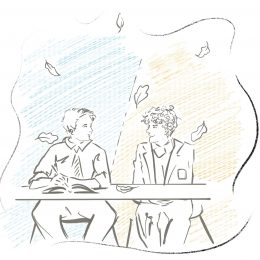Even before release, Don’t Worry Darling has been quite the topic for many reasons – and not always for the better. Pay gap rumours, alleged relationship drama between Olivia Wilde, her ex-husband, and Harry Styles, bad blood between actors… but all of that has already been discussed. Let’s give the project the benefit of the doubt and explore the film as a detached work on its own, critically. I have a lot to say, but I will be focusing primarily on the supposed feminist undertone, the cinematography of the psychological thriller genre and the loose ends that I personally (along with many other reviewers) was left unsatisfied with.
A review of ‘On Earth We’re Briefly Gorgeous’ by Ocean Vuong
A letter written to an illiterate mother. A confession that is designed to never reach the ears it is meant for. An attempt at a confession doomed to fail. Tackling class, sexuality, transgenerational trauma, violence, love and so much more, this novel is unforgettable experience.
A review of the ever-so-popular show, ‘Heartstopper’
Spoiler-free as I seek to better your lives!
‘Our Flag Means Death’: a review
It’s Pride month! Arguably the best month of the year, and we say that being completely unbiased. As GCSE students, we have plenty of time to procrastinate and watch TV instead of doing work and, oh boy, has ‘Our Flag Means Death’ (OFMD) been good way to do that. For those of you unfamiliar with the show, it’s a romantic comedy set during the Golden Age of Piracy (read: 1650s-1730s), which follows the Gentleman Pirate, Stede Bonnet (played by Rhys Darby) and famed pirate Blackbeard (Taika Waititi). Similarly to Heartstopper, a Netflix series that has also become immensely popular over the last few weeks, OFMD has queer characters and storylines at its centre – something which the majority of mainstream modern media lacks.
‘The Color Purple’ by Alice Walker – A Brief Discussion
‘The Color Purple’ is one of the most captivating books I have read in a long time, and I would thoroughly recommend it to anyone. It’s an epistolary novel published in 1982, partly based on a true story Walker’s sister told her about a love triangle her grandfather was involved in. The novel itself is set in rural Georgia from 1909-1949, in which we observe Celie growing up through her letters to God. The letters are craftily written, with an authentic feel from Celie (who isn’t largely educated), as we see from the grammatical and spelling mistakes throughout, adding to the realism of her situation. Her struggles, especially around being an African American woman in this time period, and in the Deep South, are voiced extremely well on Walker’s part. Although a fictional account on life, I feel it’s really valuable for understanding hardships and prejudices which may have been experienced here. Before I elaborate on the novel, an interesting fact is that it was banned in American School libraries from 1984-2013.



